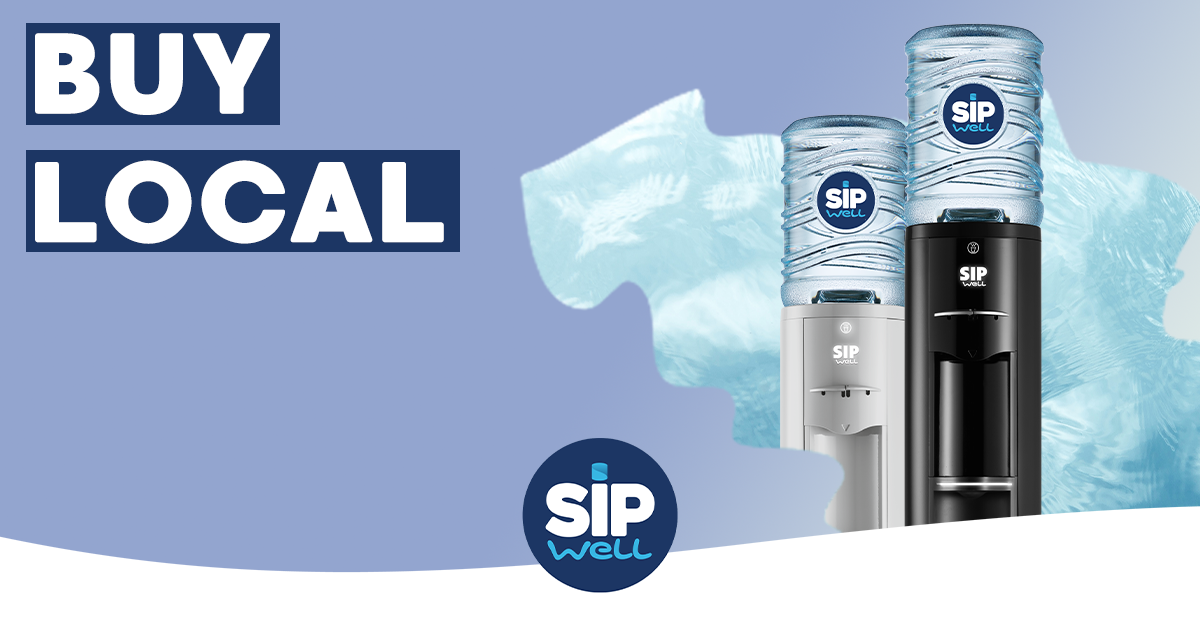Six out of ten Belgians choose local: smart tips for getting the most out of your region

There are countless benefits to buying locally: it's good for our earth, you're supporting your own economy, and both quality and service are often better. Foreign online shops are the indisputable winners of the coronavirus pandemic, but fortunately Belgians are starting to choose local. The formula is simple – adopt a smart approach and you will not only support your region, but it will also be good for you too.
When out shopping, do you ever look at the country of origin on products, and do you ever check whether a local dealer could help you before heading onto Bol.com or Amazon? A recent survey by iVox, commissioned by SipWell, shows that 41.8 percent of Belgians were already buying locally before the pandemic, and another 16.4 percent have started buying locally more regularly since the COVID outbreak.
Why buy local?
One of the biggest benefits of buying locally is that you are supporting the local economy. Moreover, when we pay money to locals, that cash largely continues to circulate domestically. A healthy economic environment also means new jobs, boosting the local community. If every Belgian family were to spend a hundred euros a month on local products, that would equate to no less than 1,785 additional jobs, according to the Union of Independent Entrepreneurs (UNIZO).
Then there is also the fact that buying locally is the most environmentally friendly approach, given that any products sourced abroad must be transported to Belgium, and the additional CO2 emissions mean a much larger ecological footprint. Transportation also tends to mean much more packaging than a local dealer would require.
Another great reason for buying locally is the fact that the quality of products is generally better than mass-produced ones – it's only natural that asparagus grown in Flanders will be fresher than the equivalent from South America. You can also rest assured that local goods are produced in accordance with the country's own rules and regulations, which means that the strictest safety standards have been followed.
Tips for buying local, smartly
There are of course also reasons why some of the interviewees prefer shops and products from beyond our borders, including the bigger range on offer and the wider choices, as well as the fact that a non-local alternative is often the cheapest. Finally, it can also be much easier to instantly order what you want from a major online store.
Although some of these reasons make sense, they do not outweigh the many benefits of buying locally, and so we have decided to gather together a few tips that will allow you to get the very most out of local products and suppliers:
- Eat fruit and vegetables when they are in season
Some vegetables are available year-round, but others are seasonally bound. For example, tomatoes are at their very best in the summer, while endives are winter fare and strawberries in turn are at their juiciest as of the last days of spring. So buy vegetables and fruit from a local farmer or keep a seasonal calendar so that you know what produce is fresh in your local supermarket and what has been shipped across the globe.
- Visit local shops selling artisanal products
Supermarkets tend to concentrate on the major brands, and even if they have a section devoted to regional products, it is still best to buy locally from smaller shops or directly from the producer. From farmers selling their own milk, eggs or produce through to artisanal stores – you'll always know that the products you buy are both genuine and fresh. As an added bonus, you know that the manufacturer or local dealer receives the full sum.
- Check whether the local option is really more expensive
Pricing is a major issue when it comes to scratching local products from your shopping list, but you should remember that a lot of local products are actually cheaper. And you will also know that you are always getting value for money, because quality is the biggest distinguishing factor for local dealers and companies.
- You can count on the expertise and service offered by local businesses
Good pre- and post-sales service is priceless, and local businesses know exactly what their customers require. If you have any queries whatsoever, a person who knows what you are looking for will always offer their knowledge and skills. These locals are also often a part of an ecosystem with other companies that use each other, so there is a good chance that you will be supporting multiple local dealers and companies when you approach one of them.
- When buying online, check first whether there isn't a Belgian version
When we purchase online we immediately think of the foreign mega-companies, but there are plenty of local alternatives. There is also the fact that many Belgian companies have made considerable investments in their online services in recent years, which means it will be very easy to buy local products online on your computer or smartphone.
Bonus tip: if searching using Google, input the product name and your region as search terms to be sure you're not automatically led to an international online store. And remember to follow local initiatives on their social media channels – sometimes you can simply place an order through a private message.
- Check labels and choose Belgian brands
Always check where a product comes from before putting it in your shopping basket. For example, your local store can easily stock a dozen or more brands of bottled water, some of which come from abroad, even though water bottled in Belgium is just as good. So don't automatically grab a bottle of San Pellegrino or Perrier, check the label and find local alternatives. And, just so you know, SipWell water is 100 percent Belgian.
Water is also more environmentally friendly and of better quality when you buy local. SipWell is the only water cooler manufacturer in Belgium that bottles and distributes water from its own local sources, which means the water you drink does not have to travel hundreds of kilometres. Daily quality checks are also performed by both in-house and external labs, which means that SipWell water is healthy, environmentally friendly and also quite simply delicious.
When you buy locally smartly you are supporting both the environment and the economy. And you gain a great deal in terms of your wellbeing and all-in experience as a customer through the local approach, thanks to the better quality and service on offer. When you add all the pros and cons together, it is indisputable that you will save financially when choosing local companies. And so, at the end of the day we all stand to gain when you buy local.



 MY ACCOUNT
MY ACCOUNT